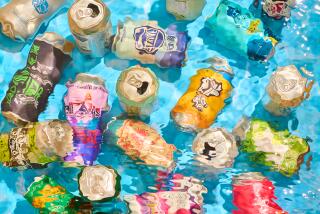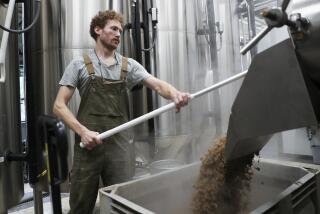Why Maryland’s Brew Pubs Feel Like They’re Over a Barrel
- Share via
ANNAPOLIS, Md. — Maryland brew pub owners say a law passed during the aftermath of Prohibition is keeping their beers from becoming the next Sam Adams or Pete’s Wicked Ale.
The 1937 statute bars restaurant-breweries from selling more than 10,000 barrels a year, a threshold that forces the brew pubs to remain strictly local labels. Some of the pub brewers, looking for wider distribution and a chance to compete with bigger-name craft brews, are threatening to leave.
Bill Muehlhauser is thinking about moving his Fordham Brewing Co. from Annapolis to a more beer-friendly state. The Baltimore Brewing Co.’s Theo DeGroen says he’ll have to cross the Maryland border to build a new brewery. And George Hancock has decided against building a new Baltimore brewery for his Seattle-based Hart Brewing Co.
Brew pub owners fought to have the General Assembly change the law this year to let pub owners set up separate brewing sites and brew up to 50,000 barrels a year. But when the Legislature’s session ended April 8, nothing had changed.
Hart was the first casualty, scrapping a plan to open a site at a former Bethlehem Steel plant. The move cost Baltimore $5 million in investment and 50 to 75 jobs, said Hancock, Hart’s president.
Now he’ll locate somewhere between Virginia and Maine, but not in Maryland.
“It’s just tough for me to understand why we wouldn’t be welcomed with open arms by any state that’s looking for jobs,” Hancock said.
State Comptroller Louis Goldstein, whose office oversees alcohol laws, intervened to urge legislators to reject the bills that would have let pub brewers sell more, insisting the current system works just fine.
“Maryland has a solid reputation in alcoholic beverage control and regulation has been scandal-free,” Goldstein wrote to Sen. Clarence Blount, chairman of the Senate Economic and Environmental Affairs Committee.
Pub brewers point out that California allows pub owners to sell wholesale and they also have had no major scandals. What they have, Muehlhauser and others say, are jobs at the 159 craft breweries that have sprung up in the Golden State over the past decade. The industry’s growth has brought 63 small brewers to Oregon, 90 to Colorado, and 26 to Illinois.
The growth of brew pubs in other states has given potency to a dispute that has fermented for years. State laws that followed the end of national Prohibition set up a three-tier system of retail pub owners, brewers and wholesalers.
A 1988 revision, prompted by Baltimore pub owner Hugh Sisson, allows restaurant-based pubs in Baltimore and in two counties to sell up to 10,000 barrels, or 310,000 gallons, annually. That’s just not enough to compete in the rapidly growing craft brewery industry, pub owners say.
Brew pub critics point out that Maryland brewers who don’t own pubs don’t have a limit. The state’s 10 independent brewers and the mammoth Stroh Brewing Co. and Anheuser-Busch Cos. can create all the suds they want as long as they don’t own a restaurant, comptroller’s office spokesman Marvin Bond said.
“At some point in its life, a business has to decide what kind of a business it is,” he said.
But pub brewers say it doesn’t work like that. A company has to sell 30,000 barrels to compete as a brewer alone, making start-up costs prohibitive, said Charles Covell III, president of the Olde Towne Tavern and Brewing Co. in Gaithersburg.
Covell looks over the border with anxiety. His biggest competitor is Old Dominion Brewing Co. in Ashburn, Va., opening its restaurant in June. In November Old Dominion plans to install enough equipment to produce 100,000 barrels.
To the north, Victory Brewing Co. brew pub in Downing Town, Pa., has no ceiling on the amount they can produce.
Covell had hoped to open a chain of brew pubs when he opened his tavern in 1994.
“That’s sort of out of the question in Maryland,” he said. “The breweries from other states are growing and growing rapidly.”
For DeGroen, Maryland’s restrictive laws make little sense. A Dutch brew master who studied beer making in Germany, DeGroen opened his east Baltimore brewery-restaurant because he wanted to create a haven for lovers of complex Bavarian-style beers.
Regulars now keep their mugs behind the bar and wash down wurst and cigar smoke with DeGroen’s trademark Marzen or another of his half-dozen offerings.
DeGroen’s brew is also widely available in Baltimore bars and since opening in 1988, DeGroen’s output has grown from 350 barrels to an estimated 6,500 barrels this year. Next year, he expects to hit the 10,000-barrel limit.
Sadly, DeGroen said, he’s wondering if he will have to build a separate brewery.
“We are starting to look around a little bit in other states,” he said.
More to Read
Sign up for Essential California
The most important California stories and recommendations in your inbox every morning.
You may occasionally receive promotional content from the Los Angeles Times.










